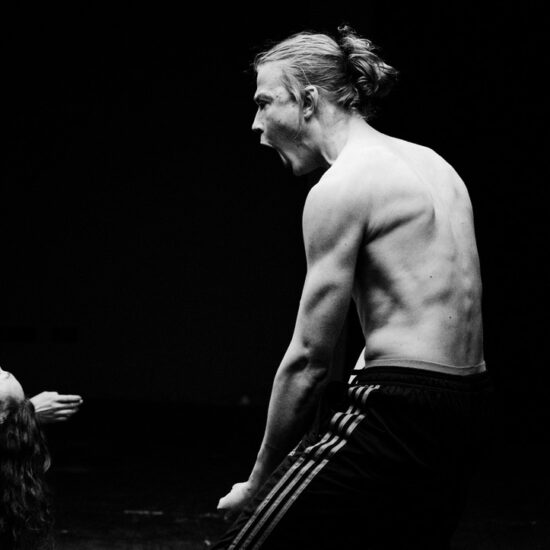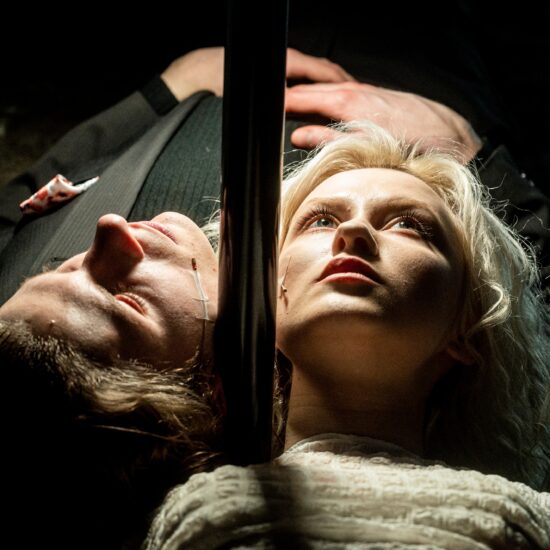CANTIO
Vykintas Baltakas and Sharon Joyce have entitled their opera project fur the Munich Biennale Cantio. Their starting point is a thesis based on experience: The significance of literary language in music theater has been overestimated. Which opera’s text can be understood in its entirety and therefore can have the effect of conveying meaning? Theatrical language consists of significantly more then written language: mimic and musical expressiveness, gestures and mime, movement (spontaneous or choreographed), transformation and make-believe, light and space. For music theater, a story meant to be read as literature must first be translated into the specific language of music theater before it can develop meaning and impact. On the basis of these facts, Sharon Joyce and Vykintas Baltakas have decided to go back to one of the sources of theatrical language: the art of rhetoric in ancient Greece. Never before was rhetoric, the art of convincing with the aesthetics of words, with their meanings and sounds, held in such high esteem or was as widely disseminated as during Western culture’s classical era – from elaborate speeches before courts of law in defense of the accused to the dramatic telling of myths to incantations, evoked with the intention of winning the gods over to one’s side or convincing them to stay in the city. Joyce and Baltakas developed their opera’s concept from the genre of farewell speeches delivered to the gods when they wanted to move on and leave an area or a city. The elaborate length of this speech (in regard to whom it was addressed to, it was always a virtual speech) was meant to delay the departure for as long as possible; its success was not determined by the message based on the speaker’s knowledge, but rather by the enchanting, captivating form and dramatics of the speech. This type of speech tended to be conceived as endless, as an excerpt from an eternal continuum; the ultimate limits of this continuum were determined by the “physique” of the farewell or the spiritual capacity of the speaker. Baltakas’ and Joyce’s opera begins with fragments, words, terms (which have the effect of audible parts of a larger whole) and fractions of remembrances, and then the opera finds its way to language forms that create expression and emphasis by means of repetition and transformation, by networks of thoughts, by the exposition of sounds and motifs, by rhythms and intonations, by structures, which change by themselves into music. The music is primarily attained from the speech. It groups around a main voice, which will be played electronically, and therefore it does not correspond to any character visible onstage. Solo voices react to it, accompany it, oppose it – at times these solo voices will be bel canto, at times they will speak in a musical fashion. An ensemble of approximately twenty musicians (a small orchestra of woodwinds and brass, percussion and string instruments) will also react to, accompany and oppose this main voice. Movements and sounds onstage will be transformed and inserted into the musical process by means of the live electronics. Thus a musical-dramatic development will be created in loops, which move in a spiral motion toward a finale – toward the “dream of a person at the end of the world, who lives his or her dreams completely and lives in his or her dreams completely” (Vykintas Baltakas, Sharon Joyce). In other words, an existence that is complete. In ancient times, people called this “god” or “deity,” in reference to an absolute, beautiful utopia of the unknown. The current segment from the potentially endless richness of the arts ends here, where the body of the work and the physique of the performance reach their limits – mythologically speaking, where song and the spoken word can no longer enchant and entice the gods. It ends as a cycle.
The opera will be sung in Ancient Greek, a language that can only really be understood by those few with a classical education. What this “speech” as music theater has to say and what it is trying to say are not conveyed primarily through the meanings of the words, but rather through intonation, sound, scenic action (on the peripheries, and not center stage), through rhythm, tempo, gestures, light and shadow, through the distance and the proximity of what is heard and seen – in other words, through all that which, in its entirety, is music theater. The different dimensions of music theater enter into a variable and non-hierarchical relationship to one another.
Accordingly, Cantio was developed in a constant and close cooperation between composer, author and director. The thoughts and ideas of one individual influenced and changed the thoughts and ideas of the others. Everything that was created during the work stages becomes at one point material to be reconsidered and reworked – a process that probably will still be ongoing even after the premiere.
Summary
Vykintas Baltakas and Sharon Joyce developed their opera project by using the genre of an ancient farewell speech intended to make the gods stay as long as possible. The music is grouped around a main voice that will be played electronically. Solo voices react to it, accompany it, oppose it – at times these solo voices will be bel canto, at times they will speak. An ensemble of approximately twenty musicians will also react to, accompany and oppose this main voice. The movements and sounds onstage will be transformed and integrated into the musical process via live electronics. Thus, a musical-dramatic development will be created in loops, which moves like a spiral toward the finale: a cycle. The opera will be sung in Ancient Greek, for the language of music theater consists of more than just the semantics of (spoken or written) words.
Set designer
Gintaras Makarevičius
Costume designer
Agnė Kuzmickaitė
Composer
Vykintas Baltakas
Musical director
Christoph Poppen
Performers (among others)
Rita Balta (soprano)
Robert Morvai (Tenor)
Randal Turner (baritone)
Cast
Egidijus Bakas
Paulius Budraitis
Vesta Grabštaitė
Rasa Jalianiauskienė
Eimutis Kvoščiauskas
Eglė Mikulionytė
Edita Užaitė
Tomas Žaibus
Judita Zareckaitė
Premiere
2004 May 18



